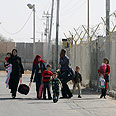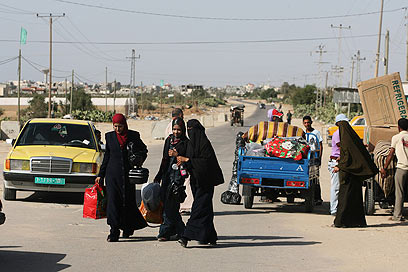
Egypt confirms: We broke Gaza blockade
Cairo says Rafah crossing to remain open for humanitarian aid, restricted travel. 'We are not going to let the occupying power escape from its responsibilities,' Foreign Ministry spokesman says. Nine parliamentarians cross into Strip to 'express support for residents'
After three years of cooperating in the Israeli blockade of Gaza,Egypt said Monday that it will leave its border with the Palestinian territory open indefinitely for humanitarian aid and restricted travel.
On Tuesday a group of nine Egyptian parliamentarians entered Gaza through the Rafah crossing. The group includes two members of the Arab Democratic Nasserist Party and seven Muslim Brotherhood members. Two of the Brotherhood members took part in last week's sail to Gaza.
The delegation members, who are visiting the Strip "to express solidarity with the residents of Gaza," are expected to meet with senior Hamas figures.
With international pressure building to ease the blockade, an Egyptian security official said sealing off Hamas-ruled Gaza has only bred more militancy.
The decision to ease the restrictions erected by Israel to isolate and punish Hamas comes a week after a deadly Israeli raid on a flotilla of activists trying to break the blockade.
The move restores a link to the outside world for at least some of Gaza's 1.5 million Palestinians. It also appeared calculated to defuse anger in the Arab and Muslim world over Egypt's role in maintaining the blockade and to show that Egypt, too, is now pressing Israel to open at least its land crossings with Gaza.
"Egypt is the one that broke the blockade," Egyptian Foreign Ministry spokesman Hossam Zaki said. "We are not going to let the occupying power escape from its responsibilities."
Israel has not publicly protested the Egyptian move, but officials declined to comment Monday.
The US, which has called the current border restrictions unsustainable, is among those pressing for changes. Vice President Joe Biden met Monday with Egyptian President Hosni Mubarak in the Red Sea resort of Sharm el-Sheikh.
He released a statement afterward saying the US is closely consulting with Egypt and other allies to find new ways to "address the humanitarian, economic, security, and political aspects of the situation in Gaza."

Palestinians at Egypt-Gaza border (Photo: AP)
In announcing the change in Egypt's position, a security official acknowledged his country was in a "continuously critical situation," and he said Israel was wrong to think the closure could pressure Hamas to meet a series of demands, including the release of kidnapped soldier Gilad Shalit, who has held since 2006.
"Israel still insists that the blockade is a pressure tool. It can release Shalit and force Hamas to stop resistance. ... On the contrary, it becomes more extremist," said the official, who spoke on condition of anonymity because of the sensitivity of the issue.
Egypt's new measures constitute an incremental change rather than a radically different approach to the border closure, in part because Egypt does not want to end up bearing sole responsibility for large-scale Gaza aid operations.
For the time being, Egypt is only allowing a restricted group of Gazans to leave the territory, including medical patients, students attending foreign universities and those with residency abroad. In nearly a week, thousands of Gazans have left and 500 tons of medical supplies were trucked in. It has done so before, sporadically and for a period limited to two or three days.
Egypt will not transfer large cargo shipments or construction material because the border crossing is designed primarily for travelers, the security official said. One such convoy, organized by Egypt's Islamic opposition movement, the Muslim Brotherhood, was stopped Monday before it got close to the border.
Hamas welcomed the Egyptian border measures but said it hoped all Gazans would soon be able to travel freely without restrictions.
"We have said since the first day that the blockade on Gaza will end, and we can see that on the ground right now. And we voice our hope that all other restrictions will be removed," Hamas spokesman Fawzi Barhoum said.
Hamas tightly controls access to Rafah, and only travelers with the proper permits can reach the terminal.
Prime Minister Benjamin Netanyahu has signaled in recent days that he is open to easing the blockade, but cannot allow ships to sail freely into Gaza's port, fearing weapons will reach Hamas terrorists. Netanyahu's spokesman, Mark Regev, said officials are considering various ideas but declined to elaborate.
Israel currently allows through only basic humanitarian goods, but Regev said it is expanding the volume of items getting in and has initiated building projects when there is a third-party guarantor to make sure construction materials do not end up benefiting Hamas.










